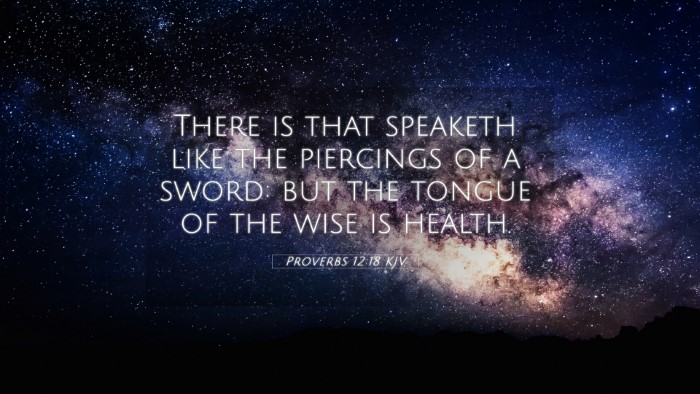Understanding Proverbs 12:18
Proverbs 12:18 states: "There is that speaketh like the piercings of a sword: but the tongue of the wise is health." This verse presents a contrast between harmful speech and the beneficial words of a wise person.
Summary of Insights
This verse emphasizes the profound impact of our words. The imagery of speech being likened to "piercings of a sword" suggests that careless or malicious words can cause significant harm, while wise words can promote well-being and healing.
Commentary Insights
-
Matthew Henry's Commentary:
Henry notes that the verse highlights the destructive nature of malicious words, which can wound the spirit far deeper than physical injuries. He encourages readers to consider the weight of their words and recognize the power they hold in either constructing or destroying relationships and communities.
-
Albert Barnes's Notes:
Barnes views the "piercings of a sword" as representing slander and gossip, which can cut deep into the hearts of those affected. Conversely, he emphasizes that wise counsel brings health and encouragement, suggesting a responsibility for believers to speak positively and supportively.
-
Adam Clarke's Commentary:
Clarke points out that words can either uplift or injure. He elaborates that the wise person uses their tongue to offer healing words, directing listeners towards positive actions and comforting them in difficult times.
Bible Verse Cross-References
When exploring cross-references for Proverbs 12:18, several pertinent verses illustrate the theme of speech and its effects:
- James 3:5-10 – Discusses the power of the tongue, comparing it to a small fire that can set great forests ablaze.
- Proverbs 18:21 – Affirms that death and life are in the power of the tongue, underscoring its significance.
- Psalms 34:13 – Encourages the keeping of one's tongue from evil and speaking deceitfully.
- Proverbs 15:1 – States that a soft answer turns away wrath, illustrating the calming effect of wise speech.
- Proverbs 10:11 – Declares that the mouth of the righteous is a well of life, contrasting with the violence of the wicked.
- Ephesians 4:29 – Urges believers to use words that build others up rather than tear them down.
- Colossians 4:6 – Advises that speech should always be gracious, seasoned with salt, to provide insight and wisdom.
- Matthew 12:36-37 – Jesus warns that people will give account for every idle word, emphasizing the importance of accountability in our speech.
Exploring Thematic Connections
The connections between Proverbs 12:18 and other scripture serve as a bridge to understanding the broader biblical themes of communication, wisdom, and the moral responsibilities of speech. By recognizing the linking Bible scriptures, one can comprehensively assess the implications of one's words within a Christian context.
Tools for Bible Cross-Referencing
To aid in further exploration, consider using the following tools:
- Bible concordance for thematic searches.
- Bible cross-reference guide for identifying linked verses.
- Cross-reference Bible study tools to examine related themes.
- Comprehensive Bible cross-reference materials to enhance understanding.
Conclusion
Proverbs 12:18 serves as a poignant reminder of the power of words. Through careful comparative Bible verse analysis and an understanding of the interconnections within scripture, readers can appreciate how profound wisdom enhances both personal discourse and communal harmony. This verse invites reflection on our speech choices and encourages the pursuit of wisdom that fosters life and health.

















